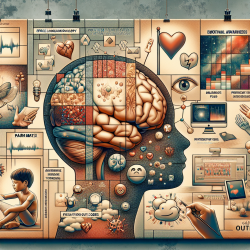Introduction
The study titled "Preserved emotional awareness of pain in a patient with extensive bilateral damage to the insula, anterior cingulate, and amygdala" provides groundbreaking insights into the neural mechanisms underlying pain perception. This research challenges the traditional understanding of the "pain matrix" and offers valuable implications for practitioners, especially those involved in speech language pathology and online therapy services like TinyEYE.
Understanding the Pain Matrix
The "pain matrix" has been a cornerstone in understanding how the brain processes pain. It suggests that specific brain regions, including the insula, anterior cingulate cortex (ACC), and amygdala, are crucial for experiencing the emotional aspects of pain. However, this study presents a unique case where a patient, despite extensive bilateral damage to these regions, maintained an intact and sometimes excessive experience of pain.
Key Findings
The study's findings are significant because they suggest that the insula, ACC, and amygdala are not necessary for the emotional experience of pain. The patient, referred to as Roger, exhibited normal pain responses across various measures such as self-report, facial expression, vocalization, withdrawal reaction, and autonomic response. These results imply that other brain regions might compensate for the damaged areas, maintaining the emotional awareness of pain.
Implications for Practitioners
For practitioners, especially those working with children in online therapy settings, these findings underscore the importance of a holistic approach to understanding pain and emotional experiences. Here are some practical implications:
- Re-evaluate Pain Management Strategies: Given that the traditional pain matrix may not fully account for pain perception, practitioners should consider alternative strategies that focus on the broader neural network involved in pain regulation.
- Emphasize Emotional Regulation: Since the study suggests that the limbic structures may play a role in regulating pain rather than being the sole substrate for pain experience, practitioners should incorporate emotional regulation techniques into therapy sessions.
- Promote Research and Education: Encourage ongoing research and education to further explore the complex neural pathways involved in pain perception and emotional awareness. This will aid in developing more effective therapeutic interventions.
Encouraging Further Research
This study opens the door for further research into the neural mechanisms of pain and emotional awareness. Practitioners are encouraged to stay informed about the latest research developments and consider how these findings can be integrated into their practice. By understanding the complexities of pain perception, practitioners can better support children in managing their emotional and physical experiences.
Conclusion
The research on preserved emotional awareness of pain challenges existing paradigms and highlights the need for a more nuanced understanding of pain perception. For practitioners, this means adopting a comprehensive approach that considers the entire neural network involved in pain and emotional regulation. By doing so, they can enhance the therapeutic outcomes for children receiving online therapy services.
To read the original research paper, please follow this link: Preserved emotional awareness of pain in a patient with extensive bilateral damage to the insula, anterior cingulate, and amygdala.










